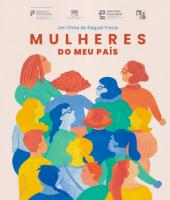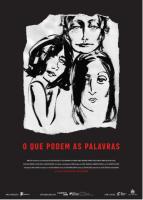
‘Unfinished Revolutions in Portuguese Literary and Visual Culture' was convened at Wadham on 15th-16th March, 2024, in anticipation of the 50th anniversary of the return to democracy in Portugal, on the 25th of April 1974. This dynamic conference sought to interrogate the gender and racial inequalities still present in contemporary society, the often-unspoken aftermath of The New State, that had endured for 41 years. An intersectional approach was employed to address these issues. Eleven papers were presented by a variety of academics working in the UK and abroad. The conference also featured the United Kingdom premieres of the thought-provoking films Mulheres do Meu País and O Que Podem as Palavras? The former was directed by Raquel Freire, and the latter by Luísa Sequeira and Luísa Marinho. The fascinating sessions investigated the political and cultural legacies of the Carnation Revolution through the analysis of media such as literature and film, aiming to provide a narrative for the often-silenced voices whilst promoting alternatives for the future.
The opening session consisted of two papers. The first was Patrícia Martinho Ferreira’s ‘Revisiting O Vento Assobiando nas Gruas through Jeanne Waltz’s cinematic lens’. It revisited Lídia Jorge’s novel O Vento Assobiando nas Gruas and its film adaptation The Fortunate Ones, highlighting themes of class, gender, and racial equality set against the backdrop of post-revolution Portugal. It underscored the critique of Portugal's self-perception as a non-racist society. The second paper, presented by Maria Inês Castro e Silva on ‘Representations of Social Invisibility in Leonor Teles’s Films’, focused on Leonor Teles’ films that spotlight marginalized Roma and fishing communities in Portugal, emphasising their social invisibility and the failures of democratic structures to address their marginalisation.
In the second session, both papers explored how films address and reinterpret significant historical events and their lingering effects in Portuguese-speaking contexts. Catriona Parry’s paper, ‘Unfinished Revolutions and the Politics of Memory in Orlando Fortunato’s Memória de um Dia (1984) and Comboio da Canhoca (1989)’ examined these films by Angolan director Orlando Fortunato, highlighting his country's fragmented nationalism and the violent legacy of Portuguese colonialism, questioning the MPLA's post-independence legitimacy. Hilary Owen’s paper ‘Gender, Memory and Revolution in Dina e Django and Brandos Costumes’ focused on Solveig Nordlund's Dina e Django, which engages with the immediate aftermath of the 25 April coup in Portugal using a personal biographical incident to delve into themes of memory, female agency, and nostalgia, while intertextually referencing the earlier film Brandos Costumes.
The third session explored the contributions of Portuguese artists and writers of African descent in addressing the complexities of the postcolonial condition and challenging dominant narratives within Portuguese society. In ‘Silenced Stories of Gendered Violence in Aida Gomes and Yara Monteiro’, Margarida Rendeiro highlighted how the two writers’ representations of intergenerational gendered violence deconstruct patriarchal discourses and facilitate healing from colonial traumas. Luísa Coelho’s paper, ‘Re-visioning the past, regenerating the present, reimagining the future: Mónica de Miranda’s diasporic art practice’ discussed Miranda’s visual and autofictional projects, which use the concept of the hyphenated, diasporic identity to propose alternative forms of globalisation and visibility for racialised bodies in Europe. Sheila Khan’s ‘The Hand and the Gaze that Map Postcolonial Invisibility in Djaimilia Pereira de Almeida and José Sérgio: Afro-descendants in 50 years of Portuguese democracy’ focused on the works of Djaimilia Pereira de Almeida and José Sérgio. She explored how their art and photography articulate the postcolonial invisibility and loneliness experienced by Afro descendants in Portugal, thus questioning the inclusivity of Portuguese democracy.

A screening of Raquel Freire’s As Mulheres do meu País was followed by a captivating Q and A session.
The second day began with a session exploring the roles and representations of women in Portuguese cultural contexts, emphasising their struggles against patriarchal structures and their contributions to broader social discourses. Caterina Cucinotta’s ‘“A cenografia era uma coisa para homens e eu fui para os figurinos”: Maria Gonzaga e a identidade “polivalente” no cinema português’ (‘“Scenography was a men’s thing and I went for the figurines”: Maria Gonzaga and the “polyvalent” identity in Portuguese cinema’) reconstructed the historical experiences of women in Portuguese cinema from the 1960s to the 1980s, highlighting the challenges they faced in a male-dominated industry. Andrzej Stuart-Thompson’s paper ‘Ana Luísa Amaral’s ethics of responsivity towards the more-then-human world’ examined Amaral’s poetic career, emphasising her subversion of patriarchal myths and her commitment to giving voice to marginalised and subaltern women. Amaral’s poetry was framed as an ethical intervention that addresses societal injustices and celebrates the interconnectedness of human and nonhuman worlds.
The final session of the conference delved into the critical exploration of Novas Cartas Portuguesas by "The Three Marias," focusing on the representation of women's experiences under patriarchal oppression. Olivia Glaze’s paper ‘Considering Female Mental Illness in Novas Cartas Portuguesas (1972): Hysteria, Sexual Disorders, and Canine Companions’ analysed the portrayal of female mental illness within the work, critiquing societal and medical perceptions of mentally ill women during the pre-revolutionary period in Portugal. It emphasised the use of patriarchal medical discourse to highlight real social and political challenges faced by women, rejecting the romanticisation of mental illness. The final paper delivered by Luísa Sequeira ‘The Three Marias: This was no country for young women’ was a continuation of an artistic and investigative project. It employed real-time expanded cinema techniques to reconstruct and reinterpret archival materials related to Novas Cartas Portuguesas. By utilising a broad visual and auditory archive, it sought to create a new narrative that challenges hegemonic power structures, reflecting on the process of memory democratisation and the artist's role as curator.
The conference concluded with a screening of O que Podem as Palavras? directed by Luísa Sequeira and Luísa Martinho.
The discussions held at this conference underscored the ongoing struggle for equality and the fragility of freedom and democracy, emphasising the importance of studying inequalities to ensure that freedom is maintained.